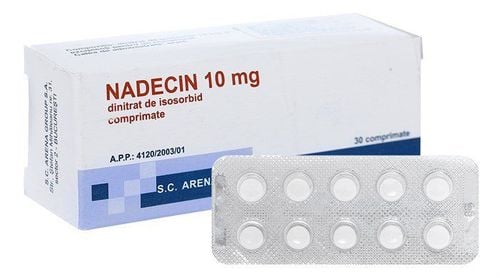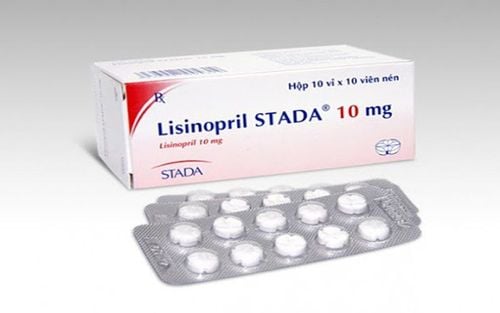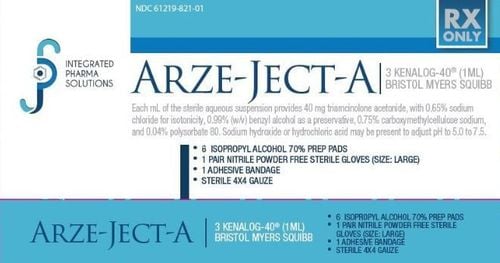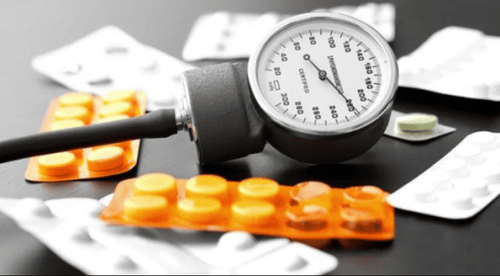This is an automatically translated article.
Hurmat is a cardiovascular drug that is prescribed according to the instructions and indications of a specialist after assessing the condition of the disease. Medicines are sold at pharmacies, hospitals... nationwide. Let's learn more about the use of Hurmat 25mg to use it more safely.
1. What is Hurmat?
Hurmat 25mg belongs to the group of cardiovascular drugs, used by prescription, domestically produced by Medochemie (Vien Dong) Co., Ltd. - Vietnam.
The main ingredient in Hurmat is Captopril 25mg, with other excipients including:
Lactose monohydrate; Microcrystalline cellulose; Cellulose powder. Hurmat packs a box of 2 blisters x 10 tablets and a box of 10 blisters x 10 tablets. The rectangular box is white, the name of the drug is black, the content is printed in orange, one side of the box is light blue with white letters. The tablet comes in the form of a round white tablet, one of which is engraved with a line.
2. Uses of Hurmat
Captopril, the main ingredient in Hurmat, is a highly selective, competitive inhibitor of the converting enzyme Angiotensin I. The beneficial effects of Hurmat 25mg are mainly due to its ability to inhibit plasma renin - engiotensin - aldosterone. Renin - an endogenous enzyme produced by the kidneys, when entering the blood converts Angiotensinogen into Angiotensin I - Decapeptide with little activity. Thanks to the role of Angiotensin-converting enzyme (ACE) - a Peptidyldipeptidase, Angiotensin I converts to Angiotensin II, which is an endogenous vasoconstrictor, has the role of constricting arteries, increasing blood pressure, stimulating the adrenal cortex to secrete Aldostenron . The ability to inhibit ACE reduces Angiotensin II in plasma, which in turn leads to a decrease in vasoconstriction and a decrease in aldosterone secretion. Although this second decrease was not significant, there was a slight decrease in serum potassium and potassium levels with loss of sodium and fluid.
In addition, the converting enzyme is the breakdown of bradykinin, a vasoconstricting peptide kinin, into inactive metabolites. Therefore, the ability to inhibit ACE leads to increased effects of the kalikrein-kinin system in circulation and locally. It contributes to peripheral vasoconstriction by activating the prostaglandin system. This mechanism may be related to the antihypertensive effect of ACE inhibitors and is the cause of some undesirable reactions.
In general, Hurmat 25mg has an inhibitory effect on angiotensin converting enzyme, lowering blood pressure, vasodilating, reducing pressure on the left and right ventricle of the heart... Used for specific subjects in the indicated section. .
3. Indications for use of Hurmat 25mg
Hurmat 25mg is indicated for patients:
High blood pressure; Heart failure (congestive heart failure); Myocardial infarction (short-term treatment, prevention of symptomatic heart failure); Kidney disease in patients with type 1 diabetes; Medicines are used strictly as prescribed by the doctor to ensure safety, avoid side effects, drug interactions.
4. Dosage, how to use Hurmat
Hurmat 250mg is used according to the blood pressure response of each specific case. The recommended dose is 150mg/day. Hurmat is taken orally before or after a main meal as directed. The tablet may be divided in half according to the markings on the tablet to comply with the recommended 12.5mg dose.
In addition, the dose of Hurmat 250mg for adults is also guided specifically:
Hypertension: In the group of hypertensive subjects, the dose is 25-50mg/day divided into 2 times. Dosage can be adjusted every 2 weeks to 100-150mg/day x 2 times if necessary. Hurmat can be used alone or with other antihypertensive agents. In patients with hypovolaemia, renal vascular hypertension, or cardiac decompensation, a single dose of 12.5 mg should be started under the supervision of a physician. Adjust dose from 50 to 100mg/day, take 1 or 2 divided doses according to specific instructions of your doctor. Heart failure: The dose of Hurmat for patients with heart failure is 12.5mg/day x 2-3 times for the starting dose. The maintenance dose can be adjusted from 75 to 150 mg according to tolerability, clinical response status. Increase dose to a maximum of 150mg/day in divided doses. Dosage adjustments should be made every 2 weeks to assess the patient's condition. Myocardial infarction: Short-term treatment dose as soon as there are clinical manifestations in hemodynamically stable subjects. Using a trial dose of 6, 25mg, after 2 hours of taking a dose of 12.5mg, after 12 hours of taking a dose of 25mg. The dose may then be adjusted to 100 mg/day twice a day for 4 weeks provided there is no hemodynamic instability. At the end of the 3-week course of treatment, the patient's condition should be assessed. With long-term treatment of myocardial infarction. Hurmat is started in the first 24 hours of the acute myocardial infarction phase, requiring treatment between the 3rd and 16th day when the required therapeutic status has been achieved. Initial treatment should be low, especially if the patient has normal or low blood pressure at the beginning of treatment. A dose of 6.25 mg should be started, followed by a dose of 12.5 mg for 2 days, 25 mg 3 times a day if there is no hemodynamic response. The recommended dose of Hurmat 250mg to protect the heart effectively during long-term treatment is 75-150mg/day x 2-3 times. Dosage can be adjusted according to the clinical response of the patient. Kidney disease in type 1 diabetes: Dosage 75-100mg/day in divided doses. Patients with renal failure: Hurmat is excreted by the kidneys, so when used, it should be used with diuretics..., the dose depends on the level of creatinine clearance. For the elderly population, a lower starting dose should be used because kidney function and other organs are impaired.
5. Contraindications to the use of Hurmat
Hurmat 250mg drug is not used in groups of people who are allergic or hypersensitive to any ingredients or excipients. In addition, the following groups of people should not use Hurmat:
Hereditary or idiopathic angioedema; History of angioedema ; Pregnancy in the middle and last 3 months; Concomitant use with preparations containing Aliskiren in patients with diabetes, renal failure. If you belong to the group of subjects with contraindications, do not use Hurmat.
6. Warnings and cautions when using Hurmat
Hurmat when used should be careful in the group of subjects with kidney disease, who are at risk of severe hypotension. In addition, Hurmat 250mg itself can slightly increase blood potassium, so avoid the combination of diuretics and salts containing potassium, if used with caution.
In addition, there are some other warnings when using Hurmat:
Increased risk of anaphylactic reactions if used concomitantly with ACE inhibitors, dialysis...; Causes a false-positive reaction when testing for acetone in the urine; Subjects with rare hereditary problems of galactose intolerance, lapp lactase deficiency, glucose malabsorption should not take Hurmat. Although Hurmat is prescribed by a doctor, you need to be very careful when using it.
Hurmat medicine 250mg is not used for pregnant women from the 4th month until the end of pregnancy because it can affect the fetus such as neonatal skull hypoplasia, anuria, kidney failure, premature delivery, even premature birth. death...
Because Hurmat is excreted in breast milk, do not breastfeed while taking this medicine.
7. Interactions with other drugs
Hurmat may interact with some specific drugs such as:
Thiazide diuretics, loop diuretics; Potassium-sparing diuretics; Other antihypertensive drugs; Drugs for acute myocardial infarction; Lithium; Non-steroidal anti-inflammatory drugs; Clonidine; Immunosuppressive drugs; Antidepressants ; Diabetes medication. When using Hurmat 250mg with the above drugs can cause side effects, reduce the effect... Therefore, be cautious when using Hurmat 250mg with other drugs.
8. Hurmat 250mg . side effects
Hurmat 250mg can cause side effects such as:
Dizziness; Rash, itching; Severe hypotension; Gastritis , abdominal pain, taste changes; Angioedema, swelling of the lips, tongue, ... The side effects when using Hurmat are different for each person, you need to monitor and notify your doctor for effective management.
9. Preservation of Hurmat
Hurmat 250mg medicine is stored at room temperature, away from heat and moisture.
Thus, Hurmat 250mg is a cardiovascular drug, used under the prescription of a doctor / pharmacist. Please consult and report unusual problems during the use of Hurmat 250mg with your doctor for effective management.
Please dial HOTLINE for more information or register for an appointment HERE. Download MyVinmec app to make appointments faster and to manage your bookings easily.













